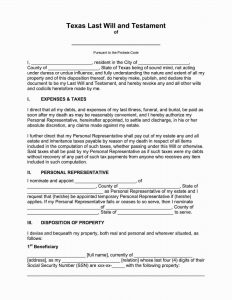When you have had a lot of success in your life, the last thing you want to do is think about losing it all. You work hard to build up a life for both you and your family, which isn’t the easiest thing to do. Filing out a Texas last will and testament is a way to choose what happens to your things, giving you the liberty to elect who they will go to and how much of your life’s earnings you will distribute to them.
To clear it up quickly before we move on to more specific issues, let’s clarify the difference between a living will and a last will and testament form. Living wills are meant for persons with some illness that could cause them to lose their best judgment. A last will is to distribute your assets and choose those you want your properties to go to.
Do You Need A Last Will?
Texas currently doesn’t require people to have a last will. However, this is something to consider as your properties will go into intestacy if you choose not to file any paperwork. This could get in the way of your preferences for distribution of property to your relatives with the state taking over. When this happens, all assets in the name of the deceased go to the spouse, followed by the children and more distant relatives. From there, the state will start to search for the closest of kin, looking for the one that is closest to you going down the family tree. This could include your parents, siblings, grandparents, and more.
Those who have beloved pets that they don’t want to leave behind without securing their care can also file a ‘pet trust.’ This means that you can secure a good life for your pet, ensuring that they are taken care of even after you’re gone. It can include any animal that you have in your care. You can select a person to care for your animals and even leave specific instructions on treating them.
Speed Up the Probate Process
Probate is the process where the distribution of properties takes place. In Texas, this is often a quick process but can often become a hassle if there is a lot of property to evaluate and distribute. With a will, you can speed up the process and run smoothly to get everything organized. Those who are getting the paperwork sorted out for the testator will have 4 years to file the proper paperwork to get the process going.
What Happens If I Die Without A Will?
A will is not required, but a common concern is what happens with the property if one is to die without having first created a will. As mentioned above, the testator’s property will enter a state of intestacy where the state will take over and start the distribution process. This is not something that happens overnight and could result in some family members disagreeing with how things are sorted out.
Things to Take Into Account
When writing up a last will, the sole purpose is to distribute properties. However, Texas has a few rules for distributions according to Estates Code, Title 2, Chapter 251. Besides that, Chapter IV, Section 59 of the Texas Probate Code, does not permit the distribution of property:
- That is in joint ownership between spouses
- That was gifted or bought during the time of marriage
Any property that was acquired before the marriage takes the title of separately owned assets and can be distributed to others besides the spouse without renouncing the desired request.
How to Write Up A Last Will in Texas
To create a last will and testament in Texas, testators must first secure a few things. First of all, anyone aged 18, serving in the armed forces, or legally married can create a last will as per the law. Second of all, the person creating the will needs to be able to make decisions for themselves. As long as these two are in place, the process is smooth and requires:
- 2 witnesses of more than 14 years of age
- A list of beneficiaries and the properties they will acquire
- A handwritten will with the signature of the testator
Create your Will Today
When you’re ready to create a Texas last will and testament, you can visit our website for a free form. All you’ll have to do is fill in all the information and ensure that you have provided all of the required documentation. Make sure you choose your beneficiaries and think about the items you wish to go to each one. Take care of the things you have worked hard for, guaranteeing that they continue to be taken care of even when you’re not around.
Other Texas Forms By Type
Other Last Will and Testament Forms By State
- Arizona will form
- California last will and testament
- Colorado will template
- Florida will
- Georgia will form
- Illinois last will and testament
- Maryland will template
- Michigan will form
- MN will form
- New Jersey will form
- New York last will and testament
- NC will template
- Ohio last will and testament
- Oregon will form
- PA will template
- SC will
- Tennessee will form
- Virginia will template
- Washington state will template
- Wisconsin last will and testament
